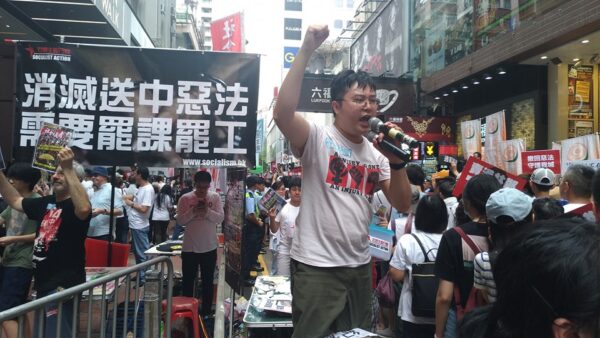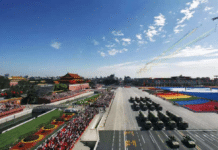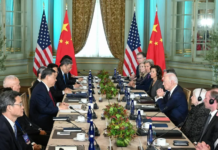Socialists fight for all, even limited democratic advances, but explain the need to overthrow capitalism
Vincent Kolo, chinaworker.info
The following is a reprint from September 2010 of our reply to criticisms on social media from a sectarian ‘Marxist’, Ozaki Takami, of the CWI’s programme and orientation in the struggle for democratic rights in Hong Kong (the CWI changed its name to International Socialist Alternative, ISA, at its World Congress in 2020). This slightly abridged version of the article is taken from the book Socialism & The Democracy Struggle in China and Hong Kong (chinaworker.info, 2018, 128 pages). We are reprinting the article because it raises important questions about how Marxists approach and intervene in mass democratic struggle which are once again on the order of the day in Hong Kong and on a more modest scale in China.
The first and most obvious difference between the CWI/Marxists and Ozaki/sectarians is that we take an active part in this and all other struggles for democratic rights. We fight for all, even limited democratic advances, but explain the need to overthrow capitalism. He dismisses the League of Social Democrats (LSD), which has mobilised significant numbers in struggle around the issue of universal suffrage and against the corporate-controlled functional constituencies, as “anti-communist populist demagogues”.
We on the other hand have recognised the emergence of the LSD and its role in struggle as a positive development in a situation where no mass workers’ party yet exists. We have engaged alongside LSD activists in struggle, while campaigning as a distinct Marxist force. The LSD today does not have a socialist or even anti-capitalist programme, but events could push this party in a leftward direction, a process that Marxists seek to hasten through our own socialist agitation, criticisms and concrete proposals.
Ozaki is completely mistaken when he states that the CWI/Socialist Action is “blatantly not” conducting its work “on the basis of a revolutionary programme that actively combats widespread illusions in liberal capitalist democracy and world imperialism”.
But unlike him, we do this from within the struggle, at workplaces and on the streets, in a dialogue with hundreds and even thousands of youth and workers, not in the virtual world that he seems to inhabit. In all these struggles the CWI intervenes independently as a clearly socialist force, with our own slogans, political material and so on. The following example is from our leaflet at a mass demonstration in June:
“We fight for democratic advances such as the abolition of the functional constituencies and election of government, but point out this alone will not deliver real democracy. For this, we need democratic control and public ownership of the banks and big companies that really rule Hong Kong and the lives of its people.
“Socialist Action, as an organisation that fights for socialism and workers’ rights, will actively support every step in the direction of a new fighting democracy movement. We say this movement must be based on the working class, with a working class political party as the main force for change. To win this movement must link mass struggles in China and Hong Kong. It must fight to abolish capitalism with its sweatshops, climate destruction and growing gap between rich and poor.” [Democratic Party betrayal saves Donald Tsang… for now! Socialist Action leaflet, 22 June 2010]

People’s Assembly?
Similar formulations, linking today’s struggle for universal suffrage with the need for the working class to overthrow capitalism, can be found in all of the material of Socialist Action, our magazine, and the chinaworker.info website.
In a similarly dishonest fashion, Ozaki attacks our demand for replacing the Legislative Council (Legco) with a genuine People’s Assembly, one with powers to introduce an eight-hour workday, a decent minimum wage, reverse privatisations, etc. Yet this is precisely an example of the transitional method of posing demands especially during an ongoing mass struggle, to link today’s immediate issues with the need for socialism.
This is the method Leon Trotsky applied but that some self-proclaimed Trotskyists never understood. Ozaki is evidently in that category. He fumes that our demand for a People’s Assembly is “reformist” and sows “illusions in bourgeois parliamentarism”. By the same token he must believe that Trotsky himself was hopelessly “reformist” when in China in the 1920s-30s he advised the communists to campaign for a Constituent Assembly, adding that this should be their “central political slogan”:
“The government that will emerge from the victorious revolution of the workers and peasants can only be a government of the dictatorship of the proletariat, leading the majority of the exploited and oppressed people. But the difference must be clearly understood between the general revolutionary perspective which we must tirelessly develop in articles and in theoretical and propaganda speeches and the current political slogan under which we can, beginning today, mobilize the masses by actually organizing them in opposition to the regime of the military dictatorship. Such a central political slogan is the slogan of the Constituent Assembly.” [Trotsky, A Reply To The Chinese Oppositionists, 22 December 1929]
What is the demand for replacing the Legco with a genuine People’s Assembly other than an updated version of the demand put forward by Trotsky, in a language that is more accessible to the youth and workers today? Furthermore, Trotsky lambasted those who refused to support this demand and who argued like Ozaki that this was feeding illusions in bourgeois parliamentarism:
“The stage of democracy has a great importance in the evolution of the masses. Under definite conditions, the revolution can allow the proletariat to pass beyond this stage. But it is precisely to facilitate this future development, which is not at all easy and not at all guaranteed to be successful in advance, that it is necessary to utilize to the fullest the inter-revolutionary period to exhaust the democratic resources of the bourgeoisie. This can be done by developing democratic slogans before the broad masses and by compelling the bourgeoisie to place itself in contradiction to them at each step.” [Trotsky, China and the Constituent Assembly, December 1928]
No matter how much he attempts to confuse the issue, Ozaki confirms in passing our suspicion: that he opposes the current struggle in Hong Kong for universal suffrage. He says that the task of socialists consists of “ripping apart the grossly misleading assertions on the alleged benefits of a Legislative Council and Chief Executive elected under universal franchise pushed by middle-class liberals…”
What Ozaki is saying is that it is “misleading” and without real, only alleged, “benefits” to end the current undemocratic selection system for Hong Kong Chief Executive and introduce one-person-one-vote elections for this position.
“Bourgeois demands”
When tens of thousands of demonstrators raise this demand, Marxists should, according to his logic, “rip apart” this idea as no more than an illusion. Instead of linking propaganda for a socialist transformation of society to the progressive striving of the masses for increased democratic rights and accountability of politicians, his crude approach, devoid of any feel for mass consciousness or the dynamics of a movement, is to counterpose socialism to these demands.
This approach has nothing whatsoever in common with Trotskyism. It is more akin to the ultimatist approach of the Bordigist sect*. Read Trotsky’s polemic against the Bordigists** who, while advocating defence of the right to strike and other rights against the attacks of Mussolini’s fascists or other reactionaries, refused to call for universal suffrage, seeing this as a “bourgeois demand”.
We can agree with Ozaki when he says socialists must fight “against the Beijing regime’s attempts to curb political freedom in Hong Kong” and “oppose reactionary measures like Article 23 [anti-subversion law] and the functional constituencies”. But why limit our role to purely defensive tasks of opposing such attacks? Why is this correct and yet according to Ozaki it is “grossly misleading” and sows illusions in bourgeois parliamentarism to press for an extension of today’s limited democratic rights.
His criticism would be valid if CWI comrades limited ourselves to calling for universal suffrage, but this is not the case as explained above. Using the transitional method of Trotsky, the CWI links demands for the widest extension of democratic rights to the need for the working class to take power and abolish capitalism.
By the same logic, it could be argued that opposing Article 23 also “sows illusions”, if by this one implied that the right to organise, to demonstrate and publish critical articles are somehow guaranteed so long as new security legislation is not introduced. That is not the case and is in fact the worst constitutional and “parliamentary cretinism”, when such things in the last analysis are not determined by legal amendments but by the class balance of forces and the readiness of the working class to struggle.
Likewise Ozaki, like many sectarians before him, lands in the swamp of reformism when he says socialists should oppose the “reactionary” functional constituencies, but leaves the matter there. The implication of Ozaki’s argument, which is completely wrong, is that the Legco, shorn of the undemocratic functional constituencies, would be acceptable to the working class.
The CWI campaigns for the abolition of functional constituencies, but we do not put this forward in isolation. Abolition would mark a step forward compared to the completely rigged Legco of today, but this measure alone is not enough, and the capitalists would secure their control over government through other less blatant and superficially more ‘democratic’ methods.
As Lenin explained Marxists are “consistent democrats”. For Marxists there is absolutely no contradiction in fighting to defend existing rights while also advocating a big extension of democratic rights. This means raising demands for an elected People’s Assembly, the election of the government, the right to vote at 16 years including migrants, and other democratic reforms, while at the same time showing that the capitalist class, backed up by the Chinese regime (which Ozaki incorrectly describes as a “deformed workers’ state”), is vehemently opposed to such an extension of democratic rights.
Marxists show that such democratic rights, which can only be won through mass struggle, will at best take on a mutilated and precarious existence unless capitalism is overthrown and replaced with a socialist society.
Stalinism
Ozaki’s muddled ideas are even more obvious in relation to the Chinese state today, which he describes as a “deformed workers’ state” and “more progressive than imperialist neo-colonies like Indonesia and the Philippines”. This completely misses what has happened in China and worldwide in the last 30 years.
A Stalinist or deformed workers’ state must have a nationalised planned economy as its economic base. The deformation of Stalinism flowed from the isolation of revolutionary Russia and the resulting loss of control over their state and economy by the working class. But this has for a long time not been the case in China. It is not enough with the survival of a “collectivised core” as Ozaki calls it, within an increasingly capitalist-dominated economy. Such a state may be called many things, but it is no longer a Stalinist deformed workers’ state.
The state-owned sector in China has been dramatically downsized during decades of pro-capitalist ‘reforms’ and accounts for less than 30 percent of GDP today. 80 percent of companies today are private or foreign-owned [China Daily, July 2010].
All the social benefits in the form of healthcare, free schooling and cheap housing that existed on the basis of a planned economy have been abolished. The remnants of a plan, in the form of guidelines and targets for the state sector and even privately-run sectors – including a plan for stock market flotations and overseas acquisitions – is not at all the same thing as a planned economy, even a bureaucratic one as existed in the past.
Imperialism
As for defending the Chinese state against imperialism – What does Ozaki suppose China is doing in Africa, Latin America and Asia? And, for that matter, in the “imperialist neo-colony” of the Philippines? Chinese capital is now the biggest foreign investor in the Philippines. The biggest ever privatisation in that country was the sale of the national power grid to a Chinese company. This, and the race to lock-up African minerals and energy, are examples of Chinese imperialism, no different fundamentally from the actions of the US or European capitalist powers. Just ask the African masses how “progressive” Chinese companies are!
Ozaki’s mistakes on the character of the Chinese state also explain why he lands on the wrong side of the fence in relation to Hong Kong’s democracy struggle. He sees the movement for universal suffrage as a bourgeois movement, replete with… “illusions in liberal capitalist democracy and world imperialism” (these are undeniable, but how to break these illusions?).
Socialists, he would argue, should stand aside from this movement. Those who intervene in this movement with a socialist program he accuses of pushing the “bankrupt idea that capitalist ‘democracy’ is the way forward for Chinese workers”!
On the other hand, he sees the current Chinese state as “of course historically more progressive” than imperialism and capitalism, when in fact its opposition to and attempts to suppress the democratic movement in Hong Kong, fearing this will spread to mainland China, flow from identical interests with the capitalist class. This is not about any defence of a “collective core” economy, but to develop even greater openings for the free flow of capital and super-exploitation of the unorganised Chinese proletariat.




